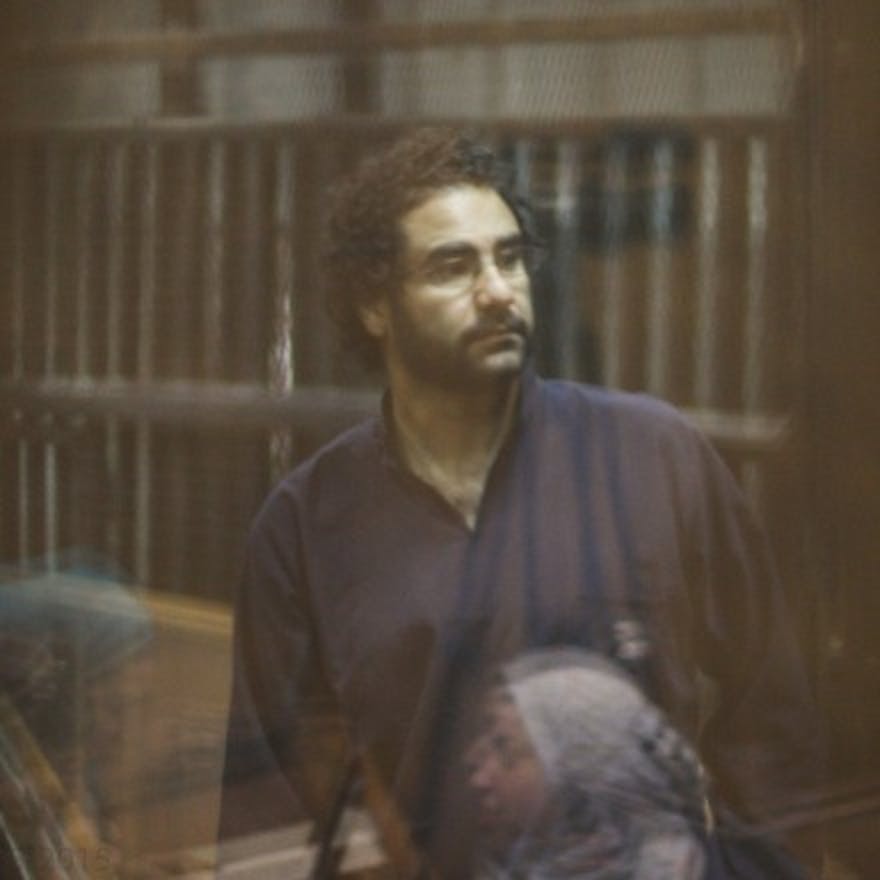https://theintercept.com/2022/10/07/egypt-cop27-climate-prisoners-alaa/
NO ONE KNOWS what happened to the lost climate letter. All that is known is this: Alaa Abd El Fattah, arguably Egypt’s highest-profile political prisoner, wrote it while on a hunger strike in his Cairo prison cell last month. It was, he explained later, “about global warming because of the news from Pakistan.” He was concerned about the epic floods that displaced 33 million people at their peak, and what that cataclysm foretold about climate hardships and paltry state responses to come.
A visionary technologist and searching intellectual, Abd El Fattah’s first name — along with the hashtag #FreeAlaa — have become synonymous with the 2011 pro-democracy revolution that turned Cairo’s Tahrir Square into a surging sea of young people that ended the three-decade rule of Egypt’s dictator Hosni Mubarak. Behind bars almost continuously for the past decade, Alaa is able to send and receive letters once a week. Earlier this year, a collection of his poetic and prophetic prison writings was published as the widely celebrated book, “You Have Not Yet Been Defeated.”

Alaa’s family and friends live for those weekly letters. Especially since April 2, when he started a hunger strike, ingesting only water and salt at first, and then just 100 calories a day (the body needs closer to 2,000). Alaa’s strike is a protest against his outrageous imprisonment for the crime of “spreading false news” — ostensibly because he shared a Facebook post about the torture of another prisoner. Everyone knows, however, that he is imprisoned to send a message to any future young revolutionaries who get democratic dreams in their heads. With his strike, Alaa is attempting to pressure his jailers to grant important concessions, including access to the British consulate. Alaa’s mother was born in England, so he was able to get British citizenship at the end of last year. His jailers have so far refused, and so Alaa continues to waste away. “He has become a skeleton with a lucid mind,” his sister Mona Seif said recently.
The longer the hunger strike wears on, the more precious those weekly letters become. For his family, they are nothing less than proof of life. Yet on the week he wrote about climate breakdown, the letter never made it to Alaa’s mother, a human rights defender and intellectual in her own right, Laila Soueif. Perhaps, he speculated in a subsequent correspondence to her, his jailer had “spilled his coffee over the letter.” More likely, it was deemed to touch on forbidden “high politics” — even though Alaa says he was careful not to so much as mention the Egyptian government, or even “the upcoming conference.”
That last bit is important. It’s a reference to the fact that in less than one month, beginning on November 6, Egypt’s Sharm el-Sheikh will play host to this year’s United Nations climate summit, known as COP27, just as other cities like Glasgow, Paris, and Durban have done in the past. Tens of thousands of delegates — world leaders, ministers, envoys, appointed bureaucrats, as well as climate activists, NGO observers, and journalists — will descend on the beach resort city, their chests bedecked in lanyards and color-coded badges.
Which is why that lost letter is significant. There is something unbearably moving about the thought of Alaa — despite the decade of indignities he and his family have suffered — sitting in his cell thinking about our warming world. There he is, slowly starving, yet still worrying about floods in Pakistan and extremism in India and crashing currency in the U.K. and Lula’s presidential candidacy in Brazil, all of which get a mention in his recent letters, shared with me by his family.
There is also, frankly, something shaming about it, something that might give pause to everyone headed to Sharm el-Sheikh. Because while Alaa thinks about the world, it’s not at all clear that the world that is about to arrive in Egypt for the climate summit is thinking much about Alaa. Or about the estimated 60,000 other political prisoners behind bars in Egypt where barbaric forms of torture reportedly take place on an “assembly line.” Or about the Egyptian human rights and environmental activists, as well as critical journalists and academics, who have been harassed, spied on, and barred from travel as part of what Human Rights Watch calls Egypt’s “general atmosphere of fear” and “relentless crackdown on civil society.”
The Egyptian regime is eager to celebrate its official climate “youth leaders,” holding them up as symbols of hope in the battle against warming (many double-talking governments like to use young people as climate props). But it’s hard not to think of the courageous youth leaders of the Arab Spring, many of them now prematurely aged by over a decade of state violence and harassment, systems that are lavishly bankrolled by military aid from Western powers, particularly the U.S. It’s almost as if those activists have just been substituted out for newer, less troublesome models.
“I’m the ghost of spring past,” Alaa wrote about himself in 2019.


